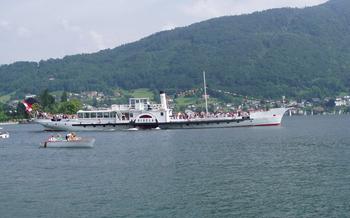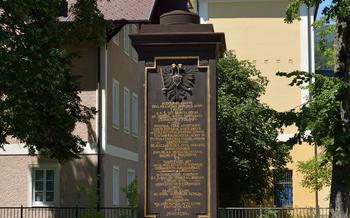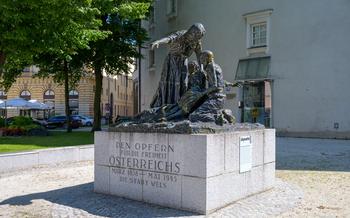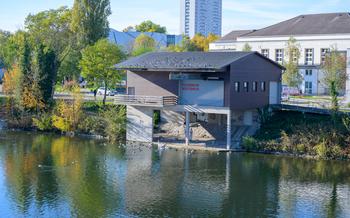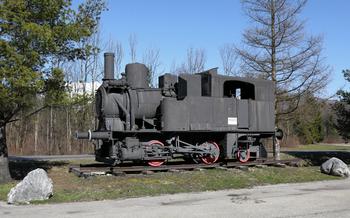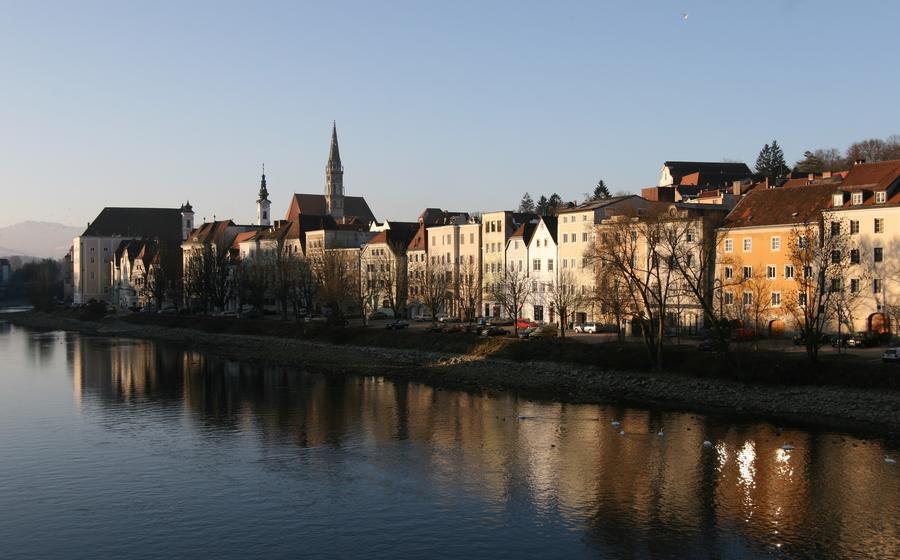
Ebensee Concentration Camp Memorial
- The Ebensee Concentration Camp Memorial: A Sobering Reminder of Austria's Dark Past
- The Ebensee Memorial Site: A Place of Remembrance
- Getting to the Ebensee Memorial Site
- Nearby Attractions and Activities
- Stories of Survival: Remembering the Individuals
- Educational Programs and Workshops
- Volunteering Opportunities: Joining the Mission
- Commemorative Events and Ceremonies
- Insider Tip: A Personal Reflection
The Ebensee Concentration Camp Memorial: A Sobering Reminder of Austria's Dark Past
During the atrocities of World War II, the Nazi regime established a network of concentration camps across Europe, with the Ebensee Concentration Camp standing as a chilling testament to Austria's dark past. Located in the town of Ebensee, nestled amidst the picturesque landscapes of the Salzkammergut region, the camp operated from 1943 until its liberation in 194Today, the Ebensee Concentration Camp Memorial serves as a poignant reminder of the horrors that unfolded within its walls, offering visitors a chance to confront the depths of human suffering and the resilience of the human spirit.
Location and Accessibility: The Ebensee Concentration Camp Memorial is situated on the outskirts of Ebensee, a scenic town in Upper Austria. Easily accessible by car or public transportation, the memorial site is open to visitors year-round, inviting them to embark on a journey through history and remembrance.
What to Expect during a Visit: As you step through the gates of the Ebensee Memorial Site, prepare for a profound and somber experience. The site encompasses the remnants of the former camp, including barracks, watchtowers, and the crematorium, all preserved to bear witness to the atrocities that took place here. A museum on the grounds provides historical context and exhibits artifacts related to the camp's operation. Guided tours are available, offering visitors a deeper understanding of the camp's history and the lives of its prisoners.
The Ebensee Memorial Site: A Place of Remembrance
In the aftermath of the war, the Ebensee concentration camp site lay in ruins, a grim testament to the horrors that had unfolded within its walls. Yet, even in the face of such devastation, the need to remember and honor the victims of Ebensee was paramount. In 1947, the camp site was designated as a memorial site, and in the decades that followed, a comprehensive effort was undertaken to preserve and commemorate the history of the camp.
At the heart of the memorial site lies the former camp grounds, where visitors can walk among the remnants of the barracks, watchtowers, and crematorium. These structures stand as silent witnesses to the suffering and atrocities that took place here, and their preservation serves to ensure that the memory of Ebensee is never forgotten.
In addition to the physical remains of the camp, the memorial site also features a museum and memorial chapel. The museum houses a collection of artifacts and documents that shed light on the history of Ebensee and the experiences of its prisoners. The memorial chapel, on the other hand, provides a space for quiet reflection and remembrance. Its walls are adorned with the names of the victims who perished at Ebensee, ensuring that their memory lives on.
The Ebensee Memorial Site is a powerful reminder of the horrors of the Nazi regime and the importance of preserving historical memory. It stands as a tribute to the victims of Ebensee and a testament to the resilience of the human spirit in the face of adversity.
Getting to the Ebensee Memorial Site
Reaching the Ebensee Memorial Site is convenient and accessible. Whether you prefer public transportation or the flexibility of a private vehicle, multiple options are available to ensure a smooth journey.
Public Transportation:
-
Train: Take the train to Ebensee station. From there, a short walk or a quick bus ride will bring you to the memorial site.
-
Bus: Several bus lines serve the Ebensee area. Check the local bus schedules to find the best route for your visit.
Driving Directions:
-
From Salzburg: Take the A1 motorway towards Linz. Exit at Regau and follow the signs to Ebensee.
-
From Vienna: Take the A1 motorway towards Salzburg. Exit at Regau and follow the signs to Ebensee.
Parking Information:
-
On-site Parking: Limited parking spaces are available at the memorial site. Please arrive early to secure a spot.
-
Public Parking: Additional parking options can be found in the nearby town of Ebensee.
Tips for Planning Your Journey:
-
Plan in Advance: Check the memorial site's website or contact them directly for any special events or closures that may impact your visit.
-
Consider a Guided Tour: Guided tours offer a deeper insight into the history and significance of the Ebensee Memorial Site.
-
Respect the Memorial Site: Remember that the memorial site is a place of remembrance and respect. Be mindful of noise levels and appropriate behavior.
Nearby Attractions and Activities
Beyond the somber reflection at the Ebensee Memorial Site, the surrounding region offers a wealth of attractions and activities. The town of Ebensee itself boasts a charming historic center, inviting visitors to explore its quaint streets, shops, and cafes.
Just a short drive away, the Traunsee lake beckons with its stunning alpine scenery. Take a leisurely stroll along the lakeside promenade, bask in the sun on one of the beaches, or embark on a boat tour to soak in the panoramic views.
For those seeking an active escape, the region is a haven for outdoor enthusiasts. Lace up your hiking boots and traverse the scenic trails that wind through the surrounding mountains, offering breathtaking vistas at every turn. Mountain bikers can also find challenging and rewarding routes, while cyclists can enjoy a leisurely ride along the scenic bike paths that crisscross the region.
Stories of Survival: Remembering the Individuals
The Ebensee Concentration Camp Memorial serves as a poignant reminder of the harrowing experiences endured by countless prisoners during the Nazi regime. Preserving their stories and experiences is crucial for understanding the atrocities committed during this dark chapter in human history. Former prisoners of Ebensee have shared their firsthand accounts, describing the unimaginable hardships, resilience, and determination they exhibited in the face of unimaginable suffering. Their testimonies offer a glimpse into the lives of those who lived and perished within the camp's walls. By learning about their experiences, we gain a deeper understanding of the human capacity for both cruelty and compassion. These stories remind us of the importance of remembering and honoring the victims, while also inspiring us to work towards a world free from hatred and intolerance.
Educational Programs and Workshops
The Ebensee Memorial Site offers a range of educational programs and workshops designed to promote understanding and prevent future atrocities. These programs are tailored to different age groups and levels of knowledge, providing participants with a deeper insight into the history of the camp, the experiences of the prisoners, and the significance of remembrance.
For students, the memorial site offers guided tours, workshops, and interactive exhibitions that explore the history of Ebensee and the broader themes of the Holocaust and World War II. These programs aim to foster critical thinking, empathy, and a sense of responsibility among young people, encouraging them to learn from the past and work towards a more just and tolerant society.
Adults can participate in workshops, lectures, and film screenings that delve into specific aspects of the camp's history, such as the role of forced labor, the experiences of women prisoners, or the process of liberation. These programs provide a platform for open dialogue, reflection, and discussion, allowing participants to gain a deeper understanding of the complexities of the Nazi regime and its impact on individuals and communities.
Through these educational programs and workshops, the Ebensee Memorial Site strives to ensure that the lessons of the past are not forgotten and that future generations are equipped with the knowledge and skills to stand up against intolerance, discrimination, and violence.
Volunteering Opportunities: Joining the Mission
The Ebensee Memorial Site relies on the dedication and support of volunteers to fulfill its mission of preserving the memory of the camp and educating future generations. Volunteering at the memorial site offers a unique opportunity to contribute to a meaningful cause and make a positive impact on the community.
There are various ways to get involved as a volunteer at the Ebensee Memorial Site. Individuals and groups can assist with tasks such as guiding visitors through the memorial site, conducting research and documentation, organizing educational programs, and maintaining the grounds and facilities. Volunteers also play a crucial role in supporting special events and commemorations held at the site throughout the year.
The memorial site welcomes volunteers from all backgrounds and skill levels. Whether you are a history enthusiast, a student seeking hands-on experience, or simply someone who wants to make a difference, there is a volunteer opportunity that suits your interests and abilities.
By volunteering at the Ebensee Memorial Site, you become part of a team dedicated to preserving the memory of the victims of Nazi atrocities and promoting understanding and reconciliation. Your contributions help ensure that the lessons learned from Ebensee continue to resonate with future generations.
To learn more about volunteering opportunities at the Ebensee Memorial Site, please visit the memorial site's website or contact the memorial site directly.
Commemorative Events and Ceremonies
Each year, the Ebensee Concentration Camp Memorial site hosts several commemorative events and ceremonies to honor the victims of the camp and remember their suffering. These events provide an opportunity for survivors, their families, and the local community to come together and pay their respects. One of the most significant events is the annual Liberation Day Ceremony, held on May 6th to commemorate the liberation of the camp by American forces in 194During the ceremony, wreaths are laid, speeches are given, and a moment of silence is observed to remember the victims. Other events include the International Day of Remembrance of the Victims of the Holocaust, held on January 27th, and the International Day of Remembrance for the Victims of Slavery and the Transatlantic Slave Trade, held on March 25th. These events are open to the public and serve as a powerful reminder of the atrocities that took place at Ebensee and the importance of learning from the past.
Insider Tip: A Personal Reflection
As I stood before the weathered barracks and overgrown mass graves of the Ebensee Concentration Camp Memorial, a profound stillness enveloped me. The weight of history pressed down upon my shoulders as I attempted to grasp the horrors that unfolded within these confines. The haunting echoes of the past whispered through the wind, carrying the stories of countless souls who suffered and perished here.
My visit to the memorial site was not merely an educational endeavor; it was a deeply emotional and transformative experience. The atrocities committed within these walls left an indelible mark on my conscience, reminding me of the darkest chapters of human history and the urgent need to confront and learn from them.
As I departed from Ebensee, I felt a profound sense of gratitude for the resilience and indomitable spirit of the survivors. Their stories served as a testament to the enduring power of hope and the human capacity for survival amidst unimaginable suffering.
The Ebensee Concentration Camp Memorial stands as a stark reminder of the destructive consequences of hatred and intolerance. It is a place where memory and history converge, inviting us to reflect on the past and work tirelessly to prevent such atrocities from ever occurring again.
In the words of renowned writer and Holocaust survivor Elie Wiesel, "To forget the dead would be akin to killing them a second time." It is our collective responsibility to preserve the legacy of Ebensee and honor the memory of those who suffered and perished here, ensuring that their stories are never forgotten and that their sacrifices serve as a beacon of hope for a more just and compassionate future.
